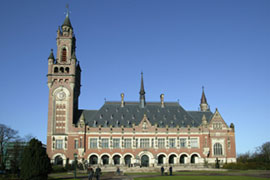The ruling by the ICJ, the UN’s top court set up to deal with disputes between states, is final with no appeal.
“International genocide”
|
|
International Court of Justice
Based in the Peace Palace in The Hague, the Netherlands the ICJ is the highest legal authority of the UN.
It began work in 1946 to resolve disputes between states and to give advisory opinions to UN bodies on questions of international law.
Permanent Court of International Justice
Operated in The Hague from 1922 under the auspices of the League of Nations, the ICJ took over its functions.
International Criminal Court
The recently established ICC is also based in The Hague and is the first permanent world tribunal for prosecuting individuals for war crimes, genocide and other human right violations.
|
In February last year, in hearings before the ICJ, Bosnia asked the court to conclude that the killings and rapes during the Bosnian war were “international genocide” orchestrated by Belgrade.
Genocide was made an international crime in 1948 when the Convention on the Prevention and Punishment of the Crime of Genocide was adopted by the UN General Assembly.
Proving genocide requires establishing intent to destroy a group, either in whole or in part, as well as demonstrating that genocidal acts took place.
Evidence presented against Serbia at the trial included the 1995 “Srebrenica massacre”, when Bosnian Serbs, having captured the city of Srebrenica, killed 8,000 people, mostly Muslims and Croats, from the town.
But Serbia said it was not responsible for the actions of Serb paramilitary groups, that the war was a conflict among ethnic groups and that there was no intent to destroy Bosnia’s Muslim population, in whole or in part.
Srebrenica killings
 |
|
The ICJ at the Hague is also known
as the World Court [GALLO/GETTY]
|
The International Criminal Tribunal for the former Yugoslavia (ICTY), the UN’s ad hoc war crimes court, as already said the killings at Srebrenica constituted genocide.
The judges there have already handed down two individual genocide convictions against Bosnian Serb officers who captured the area.
The Srebrenica massacre is the only event in the Bosnian war that the ICTY has ruled was genocide.
The ICTY has handed down a number of other verdicts relating to Bosnia, but these rulings were limited to certain events or the guilt of key people.
Monday’s ruling at the ICJ is also considered unique because it covers the whole of the war in Bosnia.
Previously, the only trial that tackled the whole of the Bosnian war the trial of Slobodan Milosevic, the former Yugoslav president, but it never came to a conclusion because Milosevic died last March, before the proceedings ended.
Regardless of the ruling, Bosnia will remain divided.
At the end of the war, as part of a 1995 peace accord, Bosnia was split into two political groups, the Bosnian Serbs’ Republika Srpska, a Bosnian Serb state, and the Muslim-Croat Federation.

